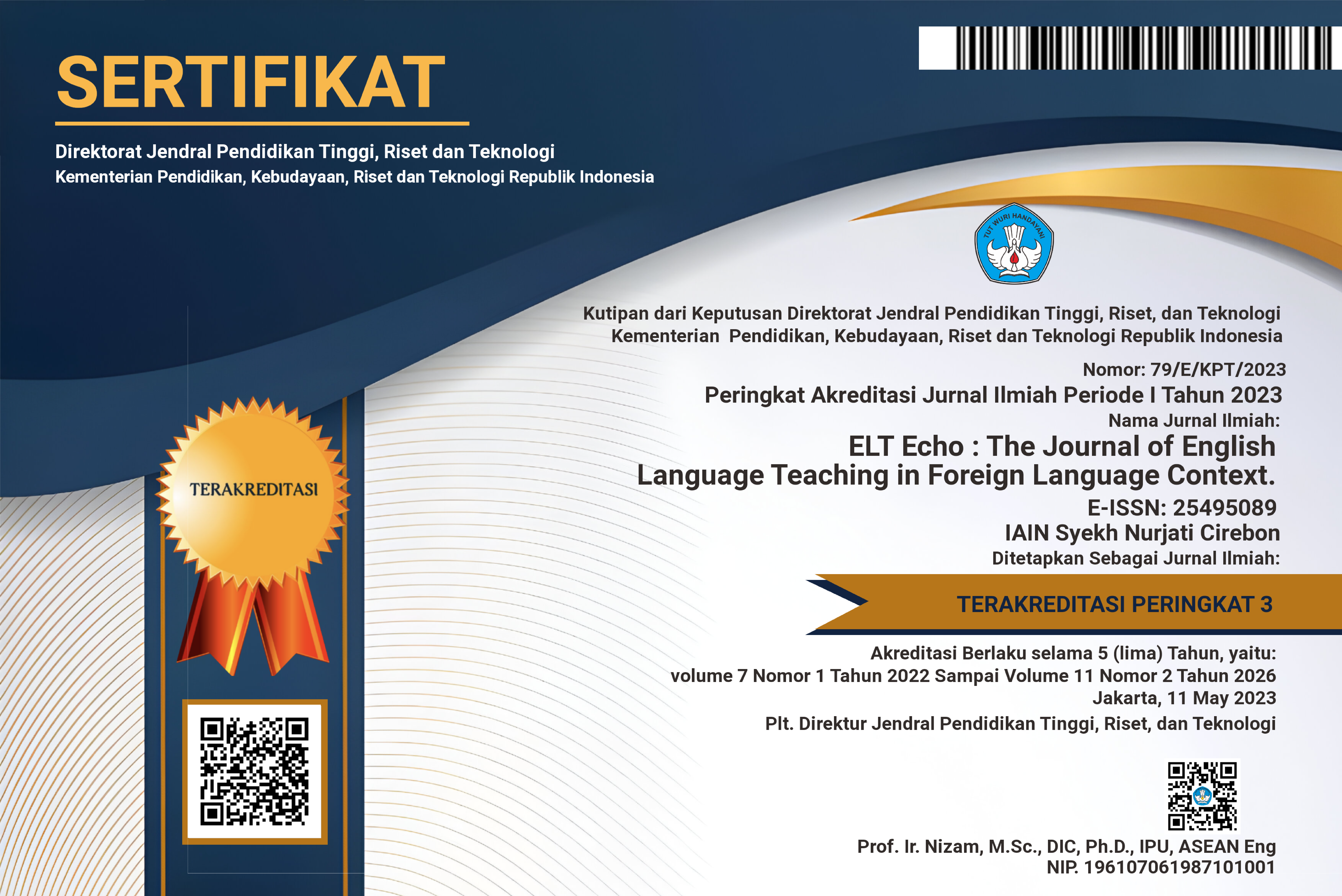TO SPEAK OR NOT TO SPEAK? THE WILLINGNESS TO SPEAK ENGLISH AMONG ENGLISH DEPARTMENT STUDENTS
(1) IAIN Syekh Nurjati Cirebon
(2) (SINTA ID: 6802258), IAIN Syekh Nurjati Cirebon
(3) UIN Sunan Gunung Djati
(4)
(*) Corresponding Author
Abstract
Keywords
Full Text:
PDFReferences
Anggriani, E. I., & Humaera, I. (2021). Seating arrangements in discussion groups as the factor of the students’ willingness to speak in English as foreign language classroom. Al-Lughawiyaat, 2(1), 9–16. https://ejournal.iainkendari.ac.id/index.php/allughawiyaat/article/download/2912/1767
Assessment English Cambridge. (2020). Qualifications for higher education.
Astuti, E. S., & Pusparini, I. (2019). Faktor-faktor yang mempengaruhi speaking performance mahasiswa jurusan pendidikan bahasa Inggris. Jurnal Filsafat, Sains, Teknologi, Dan Sosial Budaya, 25(2), 27–33.
Azwar, T. A., Harahap, A., & Azwandi. (2021). Factors influencing Indonesian EFL learners’ willingness to speak English in classrooms. JET (Journal of English Teaching), 7(2). https://doi.org/10.33541/jet.v7i2.2843
British Council Foundation Indonesia. (2022). English levels. https://www.britishcouncilfoundation.id/en/english-courses/adults/levels
Creswell, W. J., & Creswell, J. D. (2018). Research design: qualitative, quantitative adn mixed methods approaches. In Journal of Chemical Information and Modeling (Vol. 53, Issue 9).
Farhani, R., Binsasi, A. N., & Handayani, A. Y. (2020). English-speaking issues towards Indonesia senior high school students. Seminar Nasional Ilmu Pendidikan Dan Multi Disiplin 3 (SNIPMD), 442–446.
Inayah, R., & Lisdawati, I. (1970). Exploring students difficulties in speaking English and their attitude in speaking English. Acuity : Journal of English Language Pedagogy, Literature and Culture, 2(1). https://doi.org/10.35974/acuity.v2i1.585
Kurnia, Z. (2019). Voice from within: student teachers’ perception on factor influencing willingness to speak English in language classroom at English education study program of UIN Raden Fatah Palembang. Ta’dib, 24(2). https://doi.org/10.19109/tjie.v24i2.4267
López-Angulo, Y., Cobo-Rendón, R., Saéz-Delgado, F., & Mujica, A. D. (2021). Exploratory factor analysis of the student adaptation to college questionnaire short version in a sample of Chilean University Students. Universal Journal of Educational Research, 9(4), 813–818. https://doi.org/10.13189/ujer.2021.090414
Maduwu, B. (2016). Pentingnya pembelajaran bahasa Inggris di sekolah. Jurnal Warta Dharmawangsa, 50. https://doi.org/https://doi.org/10.46576/wdw.v0i50.207
Pale, E. S., & Wisrance, M. W. (2021). Analysis of demotivating factors affecting students’ willingness to speak English. ENGLISH FRANCA : Academic Journal of English Language and Education, 5(1). https://doi.org/10.29240/ef.v5i1.2026
Pennings, H. J. M., Brekelmans, M., Sadler, P., Claessens, L. C. A., van der Want, A. C., & van Tartwijk, J. (2018). Interpersonal adaptation in teacher-student interaction. Learning and Instruction, 55(2018), 41–57. https://doi.org/10.1016/j.learninstruc.2017.09.005
Ramli, K., Hidayah, J., Edy, S., & Farida Esmianti. (2020). Factors of students’ willingness and unwillingness to speak English in the classroom. Journal of English Education and Teaching (JEET), 5(52).
Rao, P. S. (2019). The importance of speaking skills in English classrooms. Alford Council of International English & Literature Journal, 2(2), 6–18. www.acielj.com
Riadil, I. G. (2020). A study of students’ perception: identifying EFL learners’ problems in speaking skill. International Journal of Education, Language, and Religion, 2(1), 31. https://doi.org/10.35308/ijelr.v2i1.2256
Riasati, M. J., & Rahimi, F. (2018). Situational and individual factors engendering willingness to speak English in foreign language classrooms. Cogent Education, 5(1). https://doi.org/10.1080/2331186X.2018.1513313
Suharsono, Y., & Anwar, Z. (2020). Analisis Stres dan Penyesuaian Diri pada Mahasiswa. 8(1), 1–12.
Wahyuddin, & AR, T. N. (2022). Adaptasi mahasiswa baru dalam perkuliahan ( Studi Kasus Tadris Bahasa Inggris STAIN Majene ). Cendikia : Media Jurnal Ilmiah Pendidikan, 12(2), 84–91.
DOI: 10.24235/eltecho.v9i1.19070
Article Metrics
Abstract view : 62 timesPDF - 14 times
Refbacks
- There are currently no refbacks.
Â
This Journal is indexed by:
Â

This work is licensed under a Creative Commons Attribution 4.0 International License.










